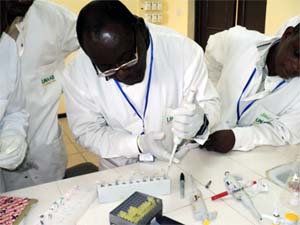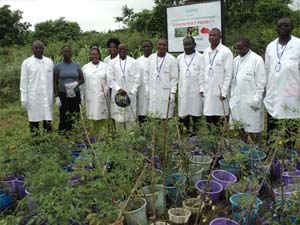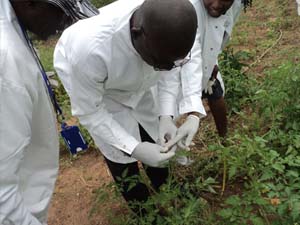18 – 22 JULY, 2011
BIOTECHNOLOGY CENTRE, UNIVERSITY OF AGRICULTURE, ABEOKUTA, UNAAB, NIGERIA.
SUMMARY OF TRAINING WORKSHOP
Preamble:
The training workshop organized by UNAAB/KNUST/DFID/BRITISH COUNCIL DeLPHE 5 research project came up at the Biotechnology Centre, University of Agriculture, Abeokuta (UNAAB), Nigeria between 18th – 22nd July, 2011.
The workshop was declared open by the Vice-Chancellor of UNAAB who was ably represented by the two Deputy-Vice Chancellors; Professor S. T. O. Lagoke (Development) and Professor C. F. I. Onwuka (Academics).
In his opening remarks, Professor Onwuka highlighted the importance of the project to the agricultural emancipation of tomato production not only in Nigeria and Ghana, but in West Africa sub-region. He identified the main objective of the project as that of capacity building, as reflected in the project title – BUILDING CAPACITY IN AGROBIOTECHNOLOGY TO IMPROVE TOMATO YIELD IN WILT-ENDEMIC AREAS OF NIGERIA AND GHANA. He saw the training workshop as a way of achieving this objective. He then congratulated the project team members, the fund provider (DfID) and the Project Manager (British Council) for keeping faith with this objective.
The Principal Investigator, Dr. A. R. Popoola, gave an overview of the project, stating that the training workshop was the last activity for the project’s first year. The Project Manager, Mrs. Bola Olaoye, speaking later reiterated that the project was expected to impact positively on farmers and enjoined the participants to ensure that the project’s sustainability was given adequate attention.
The workshop was attended by the six core members, ten participants drawn from Universities, Research Institutes, and Agricultural Development Programmes in Nigeria and Ghana. There were also one invited resource person and two laboratory assistants.
Objective of Workshop:
To equip participants with molecular tools necessary to solve tomato wilt problems in Nigeria and Ghana.
Highlights:
The training workshop was both theoretical and practical, and comprised of:-
- Lectures:
- Molecular marker and crop improvement
- Basic strategies for isolation of plant genomic DNA
- Polymerase chain reaction (PCR) and its application
- Gel electrophoresis and its application
- Restriction enzymes and other enzymes used in molecular biology.
- Practicals:
Field visits
- Observation and sampling of tomato leaves (infected and uninfected) materials from the Project’s Experimental Field.
Laboratory
- Plant genomic DNA extraction from tomato leaves using both CTAB method and Zymo Research DNA Plant/Seed Mini-prep Kit.
- Preparation of agarose gel and estimation of DNA concentration and presence.
- Preparation of PCR Mix and running of PCR.
- Agarose gel electrophoresis for amplicon confirmation
- Observation and interpretation of amplicons on Agarose gel using ultra-violet gel document equipment
- Round-table Project Evaluation Exercise Involving Project Manager and Team Members.
The workshop provided a unique opportunity for the Project Manager, Mrs. Bola Olaoye of British Council, Abuja, Nigeria, to meet with the team members and conduct a brief assessment of project’s performance in the first year.
At the evaluation exercise, the Principal Investigator informed the Project Manager that all the activities planned for the first year had been accomplished. He gave the activities which were concluded in the first year as:
- Project Stakeholders’ meeting
- Field Trip to tomato farmers’ fields in Nigeria. States covered included Ogun, Ekiti, Imo, Kano, and Plateau States. Tomato seeds, soil sample, and infected plants were collected at those places.
- Field Trip to tomato fields in Ghana. Two regions (Upper East and Ashanti-Akim) were visited in Ghana. Tomato seeds, soil sample and infected plants were also collected.
- PI’s train-the-trainer visit to University of Naples, Italy. Fifty lines and varieties of tomatoes were screened for Fusarium wilt resistance. Materials for training workshop were also collected during that trip.
- Eighty-seven lines and varieties were collected worldwide as we sourced for lines/varieties that could serve as parent lines for our breeding purposes.
|
Source |
Lines and varieties of tomatoes collected |
Comments |
|
Field Trip to farmers’ fields in Nigeria |
47 |
|
|
Kenya and Uganda |
6 |
These were collected during an ICGEB-sponsored GMO workshop in Kenya. |
|
Field Trip to farmers’ field in Ghana |
7 |
|
|
University of Naples, Italy |
5 |
|
|
AVRDC, World Vegetable Centre, Taiwan |
22 |
|
|
Total |
87 |
|
- The Training Workshop, being the last of the activities for the year.
The Project Manager challenged the team to consider the sustainability strategy for the project after its expiration. She urged the members to explore the possibilities of approaching National Agencies to provide the required continuation.
- Progress Reports by Research Students Attached to the Project
Two Ph.D and one M.Agric. students anchored to the project presented their progress reports. Participants and project team members criticized the presentation and gave various suggestions on how best to proceed with the work, within the context of project’s objective and time scale.
- Situation Reports of Tomato Wilt Problems on Farmers’ Fields
Representatives of two Agricultural Development Programmes in two States – Ekiti and Kano State – gave situation reports of tomato wilt as being experienced by the farmers in their states. They highlighted problems and proffered solutions. They expressed their belief in the project’s ability to find an acceptable solution to the problem.
- Conclusion:
The workshop was adjudged successful, as it presented a great learning opportunity for all the participants. It has also strengthened collaboration between participants from the two countries.
- Recommendations
- In future, extension personnel from Ghana should be invited to share his/her experience.
- Farmers’ representatives should be invited from Ghana and Nigeria to relate their experiences on challenges of tomato production in wilt-endemic areas
3) There is the need for more M.Sc. students to be put on the project to evaluate other tomato problems such as nematodes, insect pests and post-harvest problems.

Plate 1. Participants at the workshop, doing it by themselves.

Plate 2. Participants at the project site, standing by the tomato multiplication pots.

Plate 3. Collecting young tomato leaves for genomic DNA extraction.
